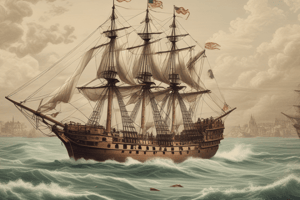Podcast
Questions and Answers
What is the primary purpose of the Declaration of Independence?
What is the primary purpose of the Declaration of Independence?
- To create alliances with other nations
- To outline the Articles of Confederation
- To establish a new form of government
- To communicate the colonies' independence and reasons for war (correct)
Which of the following statements best describes the Articles of Confederation?
Which of the following statements best describes the Articles of Confederation?
- It provided a framework for a federal republic with three branches of power
- It was easily ratified by all thirteen states
- It represented a firm league of friendship among states with limited central authority (correct)
- It established a strong central government with tax collection powers
What was a major debate during the 1787 Constitutional Convention?
What was a major debate during the 1787 Constitutional Convention?
- The abolition of slavery in the new constitution
- The establishment of a single branch of government
- The balance of power between federal and state governments (correct)
- The role of foreign nations in American politics
Which document contains the first ten amendments known as the Bill of Rights?
Which document contains the first ten amendments known as the Bill of Rights?
Who were the primary authors of the Federalist Papers?
Who were the primary authors of the Federalist Papers?
Study Notes
United States Economy and Political System
- The United States has a free-market economy, also known as capitalism. This means that economic decisions are primarily driven by private individuals and businesses, with limited government intervention.
- The United States is a democratic political system with a federal republic structure.
- The US has a presidential constitutional republic where the president is the head of state and government.
British Government and Colonial Era
- The British government during the colonial era was a monarchy/parliamentary system. Power was shared between the monarch and the parliament.
- The British Crown implemented several economic policies in the American colonies, including the Sugar Act, Stamp Act, Townshend Act, and Tea Act, which were designed to raise revenue from the colonies but were unpopular and led to increased tensions.
- The Quartering Act required colonies to provide food, supplies, and housing for British soldiers stationed in the colonies.
- Events such as the Boston Tea Party and the Boston Massacre fueled discontent and resistance to British rule in the colonies.
The American Revolution
- George Washington was appointed as the General of the Continental Army, leading the American colonists in the Revolutionary War.
- Thomas Jefferson authored the Declaration of Independence, which declared the 13 colonies independent from Great Britain and outlined the reasons for the separation.
Early American Government: Articles of Confederation
- The Articles of Confederation was the first U.S. Constitution.
- It established a "firm league of friendship" between the states, with limited power vested in the national government.
- The Articles gave little power to the central government to collect taxes, raise an army and did not have three branches of power.
- It required 9 out of 13 states to ratify legislation.
The Constitutional Convention and the US Constitution
- The Constitutional Convention of 1787 was convened to revise the Articles of Confederation, but ultimately resulted in the drafting of a new Constitution.
- The Constitutional Convention was marked by a divide between Federalists and Anti-Federalists: Federalists advocated for a stronger national government, while Anti-Federalists favored a weaker national government.
- The US Constitution has two parts: 7 articles and 27 amendments.
- The US Constitution established a Federal Republic with three branches of power: Legislative, Executive, and Judicial.
- The first three articles of the Constitution establish the *Legislative, Executive, and Judicial branches.
- The first ten amendments are known as the Bill of Rights, providing crucial protections for individual liberties.
- The Federalist Papers were a series of essays published by Alexander Hamilton, James Madison, and John Jay to explain and advocate for the ratification of the US Constitution.
James Madison and the Principles of American Government
- James Madison played a crucial role in shaping the US Constitution, particularly in developing his "Great Solution".
- Separation of Powers, Checks and Balances, and Federalism are three key principles of the US Constitution outlined by James Madison.
Studying That Suits You
Use AI to generate personalized quizzes and flashcards to suit your learning preferences.
Related Documents
Description
This quiz explores the economic and political systems of the United States and the British government during the colonial era. It covers the principles of capitalism in the US and the dynamics of the British monarchy and parliamentary system. Test your knowledge on key acts and the relationship between the colonies and the Crown!




